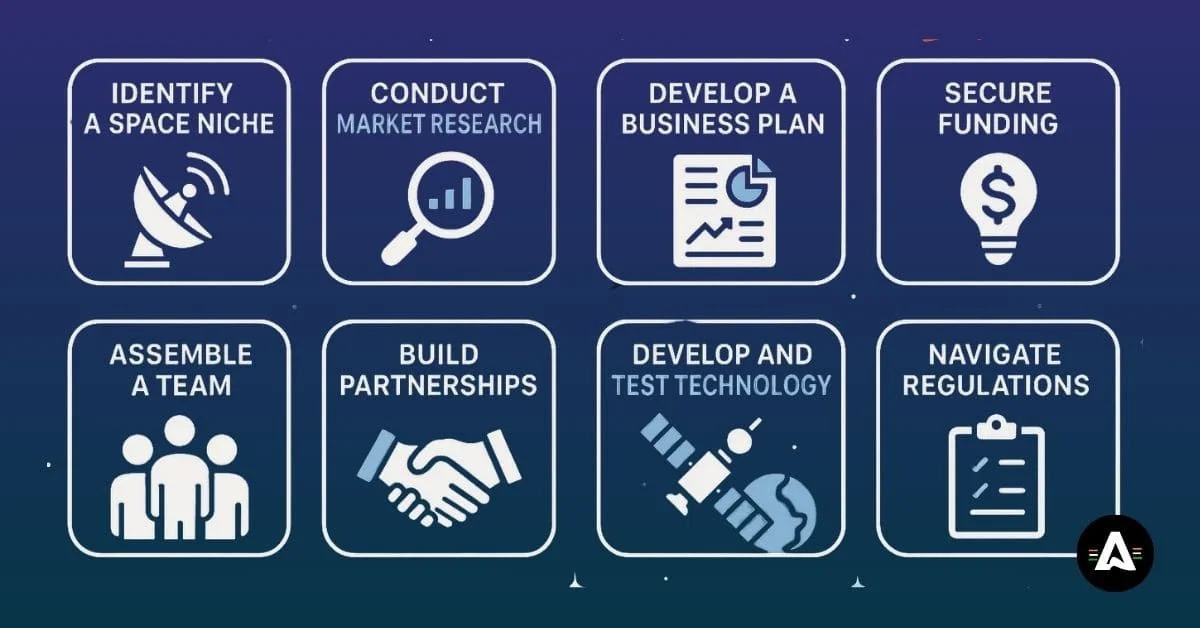How to Start a Space Tech Company in India?

A Comprehensive Guide on How to Start a Space Tech Company in India.
India’s space industry is changing fast, with new ways for the private sector and spacetech startups to grow.
The Indian Space Research Organization (ISRO) and IN-SPACe now let private players join in making satellite launch vehicles and working on other key space applications.
New space tech startups need to make sure they register and get licenses from the right Indian authorities so they can work in a legal way.
With more government support and clear rules, the space sector in India is seeing more growth and fresh ideas.
Working with ISRO and other global space groups is a smart move for businesses. This can help them get to good resources and grow faster.
For early-stage spacetech startups, it is important to handle things like intellectual property, export laws, and funding well. This will help them do well and get ahead in the space industry.
Introduction
India’s space sector is seeing a lot of change now. The indian government is letting private companies and people join in more. It takes ideas from isro’s past work. A new space policy asks spacetech startups to take part too. These startups get more help now, like from IN-SPACe.
This step lets india’s space sector do new things in aerospace. The move helps local groups grow and work better with others around the world. Because of this, india can grow its space skills. The country can also get stronger in space and make its mark for all to see.
Steps to Start a Space Tech Company in India
To do well in the Indian space ecosystem, you need to plan smart and have a clear goal. If you want to join the space sector as an entrepreneur, you have to choose your field with care. It is important to balance new ideas with what the market needs. Start by knowing your own skills. This could be in earth observation satellites or in making satellite launch vehicles. Getting this part right is a big step.
You also need to know how the private sector works. This means you have to get all the right approvals. You also need to work with big groups like ISRO.
To do well, startups in India need to check that their technology is ready. They should also find good partners who they can work with. Using policies that help entrepreneurship is important in India. The private sector plays a big part in success. You will need private sector participation if you want growth in the Indian space ecosystem.

1. Identifying Your Space Tech Niche
Picking the right niche is one of the most important things for space tech entrepreneurs. You have to decide if you want to work on earth observation satellites to get images of the world, or if you want to make new small satellites that cost less to build and use. It is important to look at both the tech side and what is possible in real life before you make your choice.
Space applications, such as using satellite-powered communication systems and data analytics, can help you make money. You may also decide to build polar satellite launch vehicles for space exploration. Each of these choices will change the amount of money, resources, and time that your company needs.
Startups need to work with development groups to get special tech knowledge and use top tools. For example, ISRO gives startups a chance to learn and work with satellite propulsion tech. If you choose a niche that fits your team’s skills, your spacetech business will have a better chance to do well.
2. Conducting Market Research and Feasibility Analysis
To get started in the space industry, you have to learn about the global space industry. You should also look at how big the market is in India. Try to see what is happening right now in the market and what things are missing. This will help you find out where your product or service might do well. At the same time, you can see who the main people in the market are. You also get to know the best practices you can use to move forward in the space industry.
A good way to see what can be done is by doing a feasibility analysis. This helps new businesses in India find out if they have a lead over foreign companies. With the right market insights, you can see the costs, find out if you will make a profit, and know who your customers will be. India gives businesses many chances to grow. It is often cheaper to make things here than in other countries.
It is good to get started early by finding out what your customers want or by building simple models of your product. Doing the work early can help your business look good to other people. A lot of indian companies have had success by meeting what the world wants in cheaper earth observation satellites. They are easy to spot, like Pixxel. If you do a strong and clear feasibility study, you can get ready to work with both local businesses and players from other countries in the space industry. This can help your startup grow in india, in the space industry, and also in the global space industry.
3. Building a Skilled Founding Team
Starting a spacetech company means having the right team. You will need people who know about aerospace, AI, and satellite tech. These skills help you build your minimum viable product, also known as MVP. A good founding team should have members with different skills. This makes the tech side of the business stronger and can help you get early investors.
You can look for people in the space sector by using LinkedIn or Google. On these sites, you can find others who like tech. Try to get people who know about AI. They should also be able to help with development. It is also good to have someone on your team who knows how to design satellite systems or work with hardware that is used upstream.
If you bring in people to help with research, development, and the way the company works, you help every part of your product meet high standards. A good first team gives your startup fresh ideas. It also helps show others that your business can be trusted. This is what early-stage investors and partners want to see in a startup.
4. Registering Your Space Tech Company With Indian Authorities
Registering your space company under Indian laws is the first thing you have to do if you want to run the business the right way. You should choose the right type of company, such as indian companies or maybe a branch from another company. Make sure all the paperwork fits with the government’s decision to keep a close look on private space activities.
Most companies start the registration in cities like bengaluru or chennai. A lot of spacetech businesses work in these cities. During registration, you have to show your business model. You also need to talk about your main goals and what your business does best in the field. Keep all your tax papers and documents about the rules ready. This will help you avoid waiting for checks or rules from any government office.
Keep talking openly with the people who check the company’s papers during this time. You may need GST exemptions or get approvals for satellite launches, so act early and register as soon as you can. Starting your spacetech business in the right way by following all the rules helps people trust you more. It also looks good to your customers and the people who put their money in to help your business grow.
5. Securing Licenses and Regulatory Approvals
Getting through the licensing steps is very important for spacetech startups in India. People who start these companies need to get the right permissions from the Indian National Space Promotion and Authorisation Centre (IN-SPACe) and also from ISRO.
Licenses often give permissions that make sure everyone follows rules from the United States about sharing intelligence. They also help things stay in line with local laws. This means people working in the private sector must run their operations according to the rules that support private sector participation.
License Type |
Details |
|---|---|
Launch Vehicle Operator License |
Secure systems and ensure conformity with IN-SPACe guidelines. |
Satellite Operations License |
Necessary for private satellite functions from Indian territory. |
Frequency Allocation for Communication |
Permission to operate satellites and manage bandwidth constellations. |
Following rules closely helps a business keep things running smoothly for a long time. It also brings in new work with other companies from around the world.
6. Developing Your First Space Tech Product or Service
Making your first minimum viable product (MVP) is a key part of gaining trust for your spacetech company. It helps people and those who might give you money see that you and your company really know the tech. For example, you may make a new rocket engine for launch vehicles or a smart earth observation satellite. No matter what you build, your MVP must show the world your technical skills.
Entrepreneurs need to work on tech models that can grow without much trouble. A good example is small satellites. These can be sent up fast and do not cost a lot of money. Things like satellite propulsion systems also help here. If you work with ISRO, you can get support. They give you tools, advice, and a helping hand when you start. This way, it is easy for you to get started in the world of tech and small satellites.
Many startups have done well because they put their energy into the MVP, or minimum viable product. Skyroot Aerospace is a good example of this in the aerospace world. They take the big ideas in engineering and make them into useful things for space. If you work hard on your product, your spacetech brand can stand out from others. This may help you get new investors and customers, and it can also help you grow.
7. Partnering With ISRO, IN-SPACe, or Other Agencies
Working with government groups like ISRO or IN-SPACe can help startups grow faster. These partnerships also build trust. They let companies use advanced tools for testing. Startups can even join launches at places like Sriharikota.
Government support is very important for people who want to work together in new ways. For example, if your startup has its own launchpad at ISRO, you will be able to send satellites into space without spending a lot of money. You and your team can use ISRO’s rocket test centers, and there are not many who get this.
Along with working together with local partners, Indian groups want startups to reach out to space agencies in other countries. Making these connections can help your business get new customers from all over the world.
8. Indian Spacetech Grants, Funds and Investors
Raising money can be hard when you start a space technology company. Many private players in india face this problem. To help with this, the government has set up a $119 million venture capital fund. The Finance Minister of India leads this plan. When talking to investors, startups need to show that their business can grow and make a profit. Investors want to see that there is good potential for profitability before they decide to give money.
Getting money from people or companies that invest in new and exciting aerospace ideas is very important. Using LinkedIn can help you find and connect with investors and others who may want to work with you. Startups should make working prototypes and show that their technology can work. This can help speed up the process of getting funds.
Having enough money is key to making a project work well, especially when the job is expensive like trying out new hardware. When you have access to funding, the work goes more smoothly. It also helps startups in the space technology field try new things and come up with fresh ideas.
9. Navigating Intellectual Property and Export Laws
Protecting your ideas and creations is very important in the spacetech field. You should try to get help from the government to get patents for your special designs in satellite parts and launch vehicles. This will stop other people from taking or using your ideas. It will also make you look good and trusted in the industry.
When you want to sell satellite technology to people in other countries, you need to follow all export laws. It is good to work with ISRO and NASA so you do the right thing between countries. You should also keep looking at defence rules. This can help you stay away from any security issues.
Startups that follow these rules well can run their business better in other countries. It can also make foreign buyers trust them more. Companies like Bellatrix Aerospace show that working inside the law can help an aerospace business grow well over time.
Key Challenges Faced by Space Tech Startups in India
Private companies that want to be in the space sector in India face a lot of problems. They do not get good access to government sites. It is not easy for them to follow all the rules. A lot of startups struggle to find the equipment they need. They do not get easy use of launchpads or places to watch and collect data. All of these things are very important if you want to build and test new products in the space sector.
The rules in the space sector are still not clear. Many people have to wait a long time to get licenses. This slows down the projects for private companies in India. There is also not enough money for these private companies. It is important to fix these problems. If we solve them, the space sector in India will be stronger and have a good future for everyone.
Limited Access to Government Facilities and Data
It is still hard for the private sector to get government support for testing and growing their business. Rocket launchpads and test areas be very costly. Most startups cannot use these sites alone. A lot of these companies need to get parts from outside the country as there are not good local choices for them.
ISRO wants to help fix this problem. The group now lets the private sector and startups use its ground and the tools. For example, ISRO gives these companies a chance to build launchpads at Sriharikota. This way, they get to use great technology, but they do not have to spend a lot.
Working closely with ISRO helps every startup do well. The private sector and ISRO can come up with new ideas faster when they share what they know. Even if there are some limits on the data, this teamwork helps both ISRO and the private sector do better.
Complex Regulatory and Compliance Processes
Dealing with rules in india can be hard for private spacetech companies. To get licenses for satellite launches, they have to spend a lot of time and money. Getting frequency slots and following export rules also takes a lot of effort and costs extra.
If India had easier ways to do these things, it would help startups move fast and make new ideas. Using the best practices from around the world in India’s space policies could help a lot.
For example, the CEO of Bellatrix Aerospace, Rohan M Ganapathy, said that taking away hard steps like performance guarantees and high security deposits will make it easier for new business people to get started. When the rules are clear and simple, the aerospace industry in India can work better and also be more ready to compete with others.
Conclusion
Starting a space tech company in India can be exciting and comes with a lot of chances. To do well in the tech world, you need to follow the right steps. First, pick your main focus area. Then, get the money you need for your business. Make sure to follow all the rules set out for companies in India. The tech industry changes quickly, so you have to stay updated with the latest news and trends.
Working with a group like ISRO can help you a lot. They give you good advice and also team up with companies to make the work easier. There may be some problems. These can be following many rules and finding what you need for the job. But if you keep working and stay with your plan, you can get ahead.
Always try to learn as much as you can and be ready for new things that may come your way. If you want to know more, or need help with what to do next, we are here to help you on your journey in india’s tech world.
Frequently Asked Questions
The Indian Space Research Organization (ISRO) and the Indian National Space Promotion and Authorisation Center (IN-SPACe) control most of the space work in India. They make the rules and make sure private companies in the country follow them. ISRO and the indian national space promotion team also help private companies by giving advice and needed approvals for work in the space field in India.
The amount of money you need at first depends on your niche and your MVP. A lot of startups have to spend a lot to make their first prototype and do research. Some even need millions to get started on the MVP. Money from venture capitalists or help from government grants can be used to pay for these big costs.
Yes, foreign companies and VCs can now put money into Indian space ventures. New government support in the FDI policy now lets up to 74% investment in satellite manufacturing. This gets automatic approval. The change helps foreign companies do business with Indian space groups. The new FDI rules make it easier for all to work together in this field.
Bellatrix Aerospace, Skyroot Aerospace, Dhruva Space, and Pixxel are growing fast in India’s tech and aerospace field. People like Rohan M Ganapathy and Prateep Basu show how good the country can be with small satellites and launch vehicle ideas. These startups use new ways to work in the aerospace world. Their work in tech and fresh thinking is helping India move forward in space.




